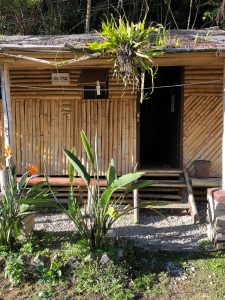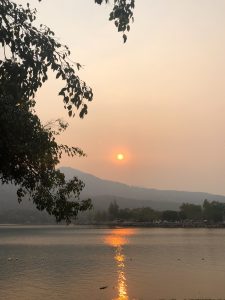Tips for Solo Travelling
Before the Covid-19 pandemic, I was lucky enough to spend a couple of months travelling around SE Asia, including Sri Lanka, Malaysia and Thailand. Although I loved travelling with friends, sometimes other people aren’t available when you want to go, or have different ideas about how they’d like to travel, so sometimes you might want to just bite the bullet and go it alone.
I have written up a few tips and tricks for planning a trip, to help you know what to expect from staying in hostels to how much you might spend on a budget! Much of this info will be relevant for travelling in general, to SE Asia and beyond.

What to pack for travelling
Trying to pack to spend several months away can be overwhelming, however there are some essentials that I would recommend taking with you:
A big backpack (35-60L).
A small backpack as cabin luggage
Plastic wallet for documents e.g. passport, passport photocopy, visa confirmations, etc.
Packing cubes – one for your clothes, one for underwear/swimwear, one for shoes and one for your washing
Travel towel – preferably microfibre – something fast-drying
Money belt/ bum bag
Sleeping mask and ear plugs
World travel adapter
Padlock
Wash bag (made of plastic or a material that can get wet), with ssential toiletries including sun cream & antibacterial hand gel. (You can buy all of this out there if you run out, but it is good to pack it before you go so you know how much space you have in your bag!)
Bug spray & bite cream (or some other form of sting relief e.g: an electronic bite relief device such as Bite away)
First aid kit (including plasters, bandages, antibacterial wipes and iodine/ antibacterial solution, tweezers)
Headphones
Notebook/ journal
Pen (this will come in handy when filling out arrival/ departure forms)
Travel Insurance
This is a must. Have a look on comparison websites to check out the different types of cover, plus the best deals for your travel insurance. There are three main types of cover:
Single Trip
This will cover you if you’re planning a one-off trip over specific dates. Your cover, including any cancellation cover, will start immediately. If you’ve got a two-week holiday planned, this is probably the right solution for you.
Annual Multi Trip
This type of policy covers you for multiple trips within a 12-month period. Your cover will not begin until your chosen start date, including any cancellation cover. Depending on the policy, there will be a limit on how long each trip can be. (Mine was up to 6 weeks per trip.)
Backpacker Trip
This will cover you for continuous travel, often to multiple countries, over a prolonged period of time. Your cover, including any cancellation cover, will start immediately. If you are going for a much longer period of time, this is probably the policy for you.
Make sure you choose a policy that covers your needs. Always read the Ts & Cs to check what you will, and won’t be covered for, such as sports, water sports or diving. Think whether you’ll need protection for transport delays or trip cancellations; check the level of cover for lost or damaged items, medical emergencies etc.
Hostels
The best (and usually cheapest) way to explore SE Asia is to stay in hostels. Hostels are usually dorm rooms with bunk beds, although you can sometimes book a private room. You can book hostels through HostelWorld (the most popular app), Agoda or booking.com apps. Most of the time you can book a hostel the night before you want to stay or even on the day, but be aware that during peak season, the highest rated hostels may be booked up quicker.
When booking a hostel, there are some key criteria to look out for:
Location
Check how close the hostel is to key amenities such as supermarkets, bars, restaurants or the beach. Being able to walk everywhere is ideal to save money, but it isn’t always possible. Some of the coolest hostels are in the middle of nowhere!
Features of hostel
Somewhere with a pool and a bar might seem ideal, but also check for features like mosquito nets and air con. Added bonuses include free breakfast or communal dinners and laundry services. Also… cleanliness is really important!
Reviews
Pay great attention to reviews, particularly when it comes to the atmosphere of the hostel: it could be a party hostel, somewhere sociable but not too loud, or somewhere quiet and off the beaten track.




Where to go
Definitely do some research before you go anywhere. Have a look at travel blogs and speak to people who have been. Also, Instagram and TikTok are great places to look for inspo.
But, my biggest piece of advice is not to over-research – it’s incredible when you stumble upon somewhere amazing by accident, or don’t know exactly what to expect when you arrive. These days, we experience a lot of things for the first time through our phone screens – try not to do that!
It’s always good to have a rough idea of where you want to go and what you want to see, but when solo travelling, it’s great to be as flexible as possible. You may meet a group of people that you really connect with, and want to join them on the next leg of their journey.
Travelling between places
There are many different ways to travel around, varying in price, comfort and duration. You can travel by coach, bus, night bus, night train, private taxi, boat or plane! Tickets can usually be bought online in advance, or from stalls at ports and bus stops, etc. Hiring a tuk tuk in Asia for a day is an easy way to get around the main tourist areas, as the drivers are very helpful in telling you the best places to go, especially quieter places that are less touristy.
You can hire a car or scooter, and some travellers enjoy hitchhiking. But never do anything that makes you feel unsafe, and do share your travel plans with family or friends: let them know where you are heading and who you are travelling with, including details such as car registration number plates.
Tips for meeting people
If solo travelling, or backpacking with a friend, meeting other people is one of the best parts of travelling. The local people are generally very friendly and keen to help. And your fellow travellers will always have great tips and recommendations, as well as stories to share. Plus, doing things in groups can help make activities cheaper! Staying in hostels makes it relatively easy to meet new people – especially if there are communal areas. Similarly, you will always meet people on organised excursions or in bars.
Here are some tips if you are nervous, or new to this:
- Try and sit in communal areas in your hostel and people will flock.
- Bring a pack of cards or other games to bring people together.
- Write on the white board/ notice board in the hostel if they have one.
- Be prepared that you may go to places where you might not meet people, or not like the people that you meet. It is all part of the journey.
- Book yourself onto excursions for half or full day trips (you can almost always barter on the price).
- Start a conversation – ask people for recommendations on things to do in the area etc. Be brave, remember everyone is in the same boat.
Food & Drink
Southeast Asian food is delicious, so you’re in for a treat. But here a few things to keep in mind:
- Restaurants and street food stalls don’t generally operate to the standards of hygiene and cleanliness you’ll be used to in the UK. The food is usually fine, but just use common sense when choosing where to eat.
- If you have specific dietary requirements or allergies, it’s helpful to have this written in the local language. People with a peanut allergy will have difficulty in SE Asia, as peanut oil is widely used for cooking.
- Do make sure you drink only bottled water!
- Tipping is not expected, but always appreciated. (Many places will automatically add a service charge to your bill, of around 5-10%.)
Budget

Everyone’s budget is different, and costs vary by country, but here’s a guide to prices from my trip (2020):
Hostels: £4-8 a night
Hotels: £15-20 a night
Eating out: £3-5 per meal
Washing: £1.50/kg of laundry
Travel: £5/6 per day to rent a scooter, £20 a day to rent a tuk tuk. Local bus journeys around £1.50, longer coach journeys up to £25
Alcohol: Expect to pay around £1.50 for a beer or £2.50 for a cocktail: Warning – they can be VERY strong!
You could spend less, and you could also spend a lot more, depending on the level of luxury you are looking for.
Overall, I had the most amazing time when solo travelling and met so many people, lots of whom will be friends for life. I also grew as a person from being out of my comfort zone, and learning from so many different experiences.
If you want to go travelling alone but are nervous, consider doing an organised trip such as a bus trip around New Zealand, or volunteering or studying abroad, where you are guaranteed to meet people. However, always do your research, be sure to go with a reputable company and try to contact people who have been there before.
Traveling solo could be one of the most exciting, enjoyable, and eye-opening things you’ll ever do. What are you waiting for?
Find out more:
11 Tips for Travellers: What to Pack, What Not to Pack & How to Save Money
Teaching English as a Foreign Language (TEFL) – Online or Abroad
